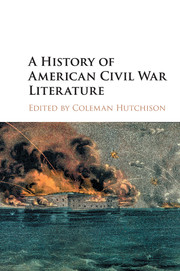Book contents
- Frontmatter
- Dedication
- Contents
- List of Illustrations
- Notes on Contributors
- Preface
- Acknowledgments
- Part I Contexts
- Part II Genres
- Part III Figures
- 12 Walt Whitman
- 13 War and the Art of Writing: Emily Dickinson's Relational Aesthetics
- 14 Herman Melville and the Civilian Author
- 15 Looking at Lincoln
- 16 Frederick Douglass, Violence, and Abraham Lincoln
- 17 Mary Boykin Chesnut: Epic and Miniature
- 18 Mark Twain
- 19 Replay: William Faulkner and the Civil War
- 20 Robert Penn Warren's Civil War
- 21 Natasha Trethewey's Civil War
- 22 Afterword: Archiving the War
- Recommendations for Further Reading
- Index
20 - Robert Penn Warren's Civil War
from Part III - Figures
Published online by Cambridge University Press: 05 December 2015
- Frontmatter
- Dedication
- Contents
- List of Illustrations
- Notes on Contributors
- Preface
- Acknowledgments
- Part I Contexts
- Part II Genres
- Part III Figures
- 12 Walt Whitman
- 13 War and the Art of Writing: Emily Dickinson's Relational Aesthetics
- 14 Herman Melville and the Civilian Author
- 15 Looking at Lincoln
- 16 Frederick Douglass, Violence, and Abraham Lincoln
- 17 Mary Boykin Chesnut: Epic and Miniature
- 18 Mark Twain
- 19 Replay: William Faulkner and the Civil War
- 20 Robert Penn Warren's Civil War
- 21 Natasha Trethewey's Civil War
- 22 Afterword: Archiving the War
- Recommendations for Further Reading
- Index
Summary
The American Civil War was a major theme for Robert Penn Warren from his first poetry in the middle 1920s to a biographical essay about Jefferson Davis in 1981. Between these texts, Warren published a biography of John Brown, two Civil War-focused novels, a book length “tale for verse and voices” about slavery, a book about the legacy of the war, and a dozen poems on Civil War subjects. The meaning of the Civil War is also a major issue in works that do not center on the war as well, such as All the King's Men, where an inset short story set in the Civil War era sets the moral tone of the novel. The Civil War is even an important concern of Warren's literary criticism, particularly of his work with the poetry of Melville and Whittier and the fiction of Dreiser, his discussion of other southern writers, and his work as an anthologist. During the Civil Rights era, Warren emerged as a major southern liberal voice, arguing that the South could accept racial integration without fatally surrendering its culture. Warren's texts on Civil War themes record his changing views about race and his embrace of racial integration, but they also record his constant disappointment and disenchantment with the world that emerged from the Civil War and modernity more generally. At his best, Warren articulates a tragic, nonideological vision of the war, seeing it as the result of a conflict between the ideal of justice and the concrete institutions that are supposed to be shaped by that ideal.
The Legacy of the Civil War
Robert Penn Warren's The Legacy of the Civil War is, for all its brevity, the most thoughtful and original text to emerge out of the Civil War centennial. It is also the key to five decades of texts Warren wrote about the Civil War, because everything that leads up to that book is either a prefiguration or a rejected early take, and everything that follows it is either a development or a rethinking of the ideas Warren developed in it.
- Type
- Chapter
- Information
- A History of American Civil War Literature , pp. 303 - 315Publisher: Cambridge University PressPrint publication year: 2015

